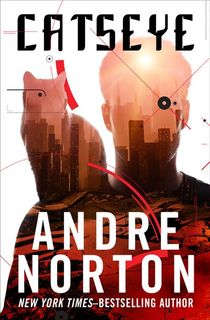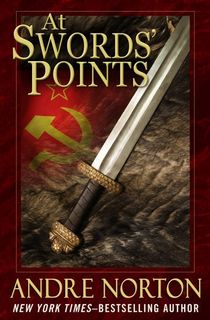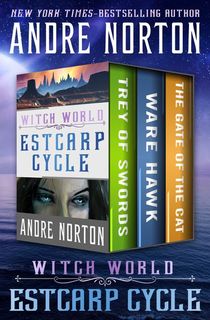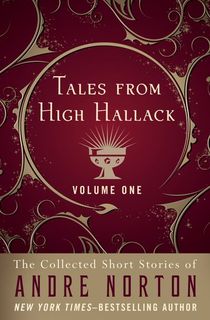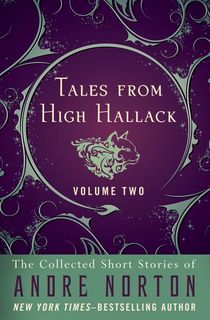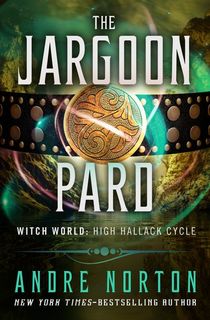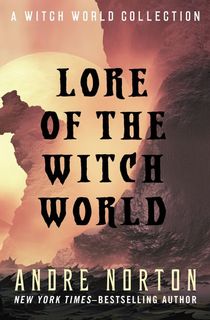Influential sci-fi and fantasy author Andre Norton, who during her life authored or co-authored over 150 novels, would have turned 108 on February 17th.
We're honoring her memory by sharing photos taken throughout her extraordinary life, courtesy of the Andre Norton Estate.

Norton was born in 1912 in Cleveland, Ohio. Here she is with her parents in an undated photo.
Photo Credit: Courtesy of the Andre Norton Estate.Andre Norton was born Alice Mary Norton in Cleveland, Ohio in 1912, the daughter of a rug-company owner. Norton was seventeen years younger than her sister, and as such had a fairly solitary childhood with her parents, Adalbert Freely Norton and Bertha Stemm Norton. Her parents fostered a love of books in their daughter from a very early age, reading to Norton — who counted The Wonderful Wizard of Oz among her
favorite books — and taking her on weekly trips to the library. Norton funneled her passion for storytelling into a position on a literary page in her school newspaper. Even in adulthood, she and her parents shared a bond through reading and writing, with Bertha Stemm Norton often acting as a proofreader for her daughter's books.
RELATED: 10 Andre Norton Books Everyone Should Read
When the great depression hit, Norton took a job with the Cleveland Library System to help support her family, and juggled this new responsibility with night classes in journalism and writing.

A former children’s librarian, Norton wrote many books for young readers and was always happy to meet with them and talk about stories and reading.
Photo Credit: Courtesy of the Andre Norton Estate.In 1934, Norton published her first book, The Prince Commands. The book's target demographic was juvenile boys, and that same year Norton legally changed her name from Alice to Andre on the advice of her publisher, the rationale being that the intended audience for her books would be more likely to read work by a male author. In 1999, Norton told The Associated Press of the decision, “There were about five women writing fantasy [...] We had no choice.”
RELATED: 10 Female SFF Authors and the Stories Behind Their Pseudonyms
Even at her day job, Norton's imagination and capacity for world-building was evident. A supervisor of hers at the library wrote of Norton in a 1935 recommendation letter, "her speech is very formal, sometimes the children are amazed by her long words, but she writes wild tales with quickness and ease. Her imagination seems well directed."
Norton was also partially responsible for introducing some now-iconic sci-fi and fantasy books, then considered trashy, into Cleveland's library system.
Later in life, she recalled: "Each month the librarians would receive a book to review. If there was some objection to the book, and we still wanted it, we would have an opportunity to defend it. I remember getting The Hobbit and nobody had heard of Tolkien, so I had to argue for it like mad."
RELATED: The Best Opening Lines in Science Fiction and Fantasy
Throughout the early 1940s, Norton continued working at library and library-adjacent jobs, even while publishing new titles. In 1942, she published her third book, Follow the Drum, the first in three World War II spy novels. It was followed by The Sword is Drawn and At Swords' Points.
From 1940-1941, Norton worked on a citizenship project at the Library of Congress, but the initiative was closed when the U.S. entered World War II. Around the same time, Norton purchased a Maryland bookstore called Mystery House.
The venture ultimately was unsuccessful, and Norton returned home to Ohio in 1942 and continued work with the Cleveland Public Library, where she remained for eight years.

Norton shared her life with many cat companions.
Photo Credit: Courtesy of the Andre Norton Estate.In 1947, Norton published her first work of fantasy: a short story titled “People of the Crater" that was included in Fantasy Book Vol 1. Soon after, she transitioned to a job that reflected her interest in genre fiction, joining the small publisher Gnome Press as an editor.
In 1950, she published her first science fiction novel Huon of the Horn, with more sci-fi books coming in quick succession.
In 1958, Norton was able to transition into writing full-time. In 1963, Witch World — the first volume of her series
by the same name — was published by Ace Books. Ultimately, 12 books set in Norton's unique Witch World universe would be published.

Norton painted this watercolor of a bird and a poppy. Her former business manager, Ingrid Zierhut, attended art classes and painted as a hobby. Ingrid tried to get Norton interested in painting, but Norton didn't care too much for it. She painted only eight watercolors in total.
Kirkus Reviews notes that Norton didn't receive the recognition early in her writing career that she might have, had she not been initially known for juvenile fiction. Regardless, Norton's accomplishments ultimately came to be recognized.
In 1977, she was the first-ever woman to be honored with the Gandalf Award, which recognizes achievement in fantasy literature.
Seven years later, in 1984, she became the first woman ever named Science Fiction Grandmaster by the Science Fiction and Fantasy Writers of America (SFWA), and in 1997 she was the first woman admitted into the Science Fiction Hall of Fame.

Norton was the first woman to be named a Grand Master by the Science Fiction Writers of America. Here she is with the award, given to her in 1984.
Photo Credit: The Andre Norton EstateNorton found many ways to assist up-and-coming authors, thereby giving back to the genre that was beginning to recognize her worth. After Norton's death, Jane Jewell, executive director of SFWA, praised her generosity in The Associated Press: "On many occasions, she worked with new writers and collaborated with them on novels to help them get started."
RELATED: 19 Best Sci-Fi Book Series You Won't Want to Miss
In 1999 Norton also founded a research library designed to assist her fellow writers, the High Hallack Genre Writer's Research and Reference Library. High Hallack — so named after a country in the Witch World series — offered genre authors temporary room and board, as well access to the 10,000 titles she'd amassed in the library collection.
In the three-room-garage-turned-library, authors could find books on science, weaponry, war, mythology, and many other subjects helpful in conducting research for sci-fi and fantasy world-building. High Hallack operated in Murfreesboro Tennessee until 2004, when Norton's health began to seriously fail and the collection was auctioned off.
Norton's many contributions to the genre were again recognized when on February 20th, 2005, the SFWA announced the creation of an annual Andre Norton Award for Young Adult Science Fiction and Fantasy. Norton barely lived to see the tremendous honor.
She passed away less than a month later, on March 17th, 2005, from congestive heart failure at the age of 93. At her request, Norton was cremated with copies of her first and last novel.

Andre Norton died in Murfreesboro, Tennessee, in 2005. This is a picture of her ashes at her final resting place.
Photo Credit: Courtesy of the Andre Norton Estate.13 years before her death, Andre Norton was interviewed by bibliographer IIrene Harrison. When asked what she wanted from her career, Norton replied "I just don’t want to be forgotten." In 2020, it is clear Norton has achieved this goal.
Norton's legacy can be seen in part in the prestigious recipients of the Andre Norton Award, including J.K. Rowling (2008, Harry Potter and the Deathly Hallows); Terry Pratchett (2011, I Shall Wear Midnight); Nalo Hopkinson (2014, Sister Mine); and Tomi Adeyemi (2019, Children of Blood and Bone).
Since Norton's death, her legacy lives on, both in her staggeringly vast and inventive body of work, but also in the trail she blazed for the female science fiction and fantasy authors who came afterwards.
.jpg?w=32)
Norton’s fans were legion. Here they line up for her signature at a science fiction convention.
Photo Credit: Courtesy of the Andre Norton Estate.Celebrate Norton's birthday with one of her incredible books!
Featured image of Andre Norton via the Andre Norton Estate.
[via AndreNortonBooks.com; Kirkus Reviews; Ohio Reading Road Trip; Notable Biographies]
This post is sponsored by Open Road Media. Thank you for supporting our partners, who make it possible for The Portalist to continue publishing the stellar stories you love.

